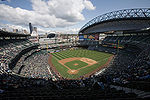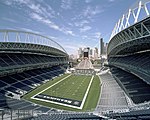Stadium station (Sound Transit)

Stadium station is a light rail station located in Seattle, Washington. It is situated between the SODO and International District/Chinatown stations on Line 1, which runs from Seattle–Tacoma International Airport to Downtown Seattle and the University of Washington as part of the Link light rail system. The station consists of an at-grade island platform at the intersection of the SODO Busway and South Royal Brougham Way in the SODO neighborhood of Seattle, adjacent to Lumen Field and T-Mobile Park. Stadium station was proposed in 1998 as part of the segment between the Downtown Seattle and Beacon Hill tunnels and subsequently deferred months later. It was reinstated in 2005 and construction of the station was completed in May 2006, several years before Link light rail service began on July 18, 2009. Trains serve the station twenty hours a day on most days; the headway between trains is six minutes during peak periods, with less frequent service at other times. Stadium station is also served by several Sound Transit Express and King County Metro buses that stop on the SODO Busway west of the platform, as well as the Seattle Greyhound station east of the platform.
Excerpt from the Wikipedia article Stadium station (Sound Transit) (License: CC BY-SA 3.0, Authors, Images).Stadium station (Sound Transit)
South Royal Brougham Way, Seattle International District/Chinatown
Geographical coordinates (GPS) Address External links Nearby Places Show on map
Geographical coordinates (GPS)
| Latitude | Longitude |
|---|---|
| N 47.591333333333 ° | E -122.32716666667 ° |
Address
Stadium
South Royal Brougham Way 501
98134 Seattle, International District/Chinatown
Washington, United States
Open on Google Maps








